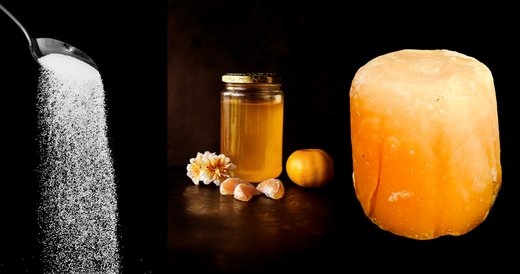
Red Wine Vinegar Vs Apple Cider Vinegar: Which is Better Choice?
Vinegar has long been regarded for its versatile uses in cooking, medical purposes, cosmetic uses, and even cleaning. Among the different types of vinegar available on the market, two stand out for their unique flavor, culinary use, and health benefits.
These are red wine vinegar and apple cider vinegar. To know which one to add to your pantry, it is essential to understand their differences, uses, benefits and nutritional offerings.
Key Differences
The primary difference between red wine vinegar and apple cider vinegar is in its source, colour and taste. An overview of red wine vinegar vs apple cider vinegar is enlisted below.
|
Metrics |
Red Wine Vinegar |
Apple Cider Vinegar |
|
Source |
Fermentation of red wine. |
Fermentation of apple cider. |
|
Colour |
Deep red. Can lighten with time. |
Golden brown, deep amber |
|
Taste |
Tangy and sharp with fruity notes of grape |
Tangy and acidic with a fruity note of apples |
|
Smell |
Like red wine |
Fruity and acidic |
|
pH Level |
3 |
2- 3 |
|
Nutritional Value |
Vitamins, minerals, sodium, iron, potassium, antioxidants |
Vitamins, minerals, Iron, Magnesium |
|
Uses |
Cooking, Health benefits |
Cooking, Health Benefits, Skincare, Haircare |
Difference Between Red Wine Vinegar & Apple Cider Vinegar

Red wine vinegar is a product of double fermentation. First, red wine is made by fermenting dark-coloured grapes. Then, the resulting wine goes through an alcoholic fermentation process, during which the Acetobacter bacteria assist the chemical process of turning the alcohol into acetic acid. This gives the vinegar its distinct acidic taste. Good quality red wine vinegar is often aged in a bottle to maximise its flavour.
Apple cider vinegar, or ACV, is also a product of double fermentation. Firstly, fresh apples are crushed to make apple cider, which is unsweetened and unfiltered. Then, a starter, commonly referred to as the 'mother, ' is added to the apple cider to ferment the apple cider sugars to make alcohol, which is fermented a second time to turn into acetic acid. The main acidic ingredients giving organic apple cider vinegar its distinct taste are acetic acid and malic acid.
Comparing the Nutritional value
Red wine vinegar and apple cider vinegar are not extremely rich sources of essential vitamins and minerals, although they contain minor amounts of specific nutrients. While iron, potassium, manganese, and sodium are found in red wine vinegar, apple cider vinegar has magnesium and iron. Both types contain antioxidants, which contribute to their health benefits.
Also, Read:
Nutritional Composition of Red Wine Vinegar (100g)
|
Water |
94.5 g |
|
Energy |
19 kcal |
|
Protein |
0.04 g |
|
Ash |
0.17 g |
|
Carbohydrate |
0.27 g |
|
Calcium |
6 mg |
|
Iron |
0.45 mg |
|
Magnesium |
4 mg |
|
Phosphorus |
8 mg |
|
Potassium |
39 mg |
|
Sodium |
8 mg |
|
Zinc |
0.03 mg |
|
Copper |
0.01 mg |
|
Manganese |
0.046 mg |
|
Vitamin C |
0.5 mg |
Nutritional Composition of Apple Cider Vinegar (100 g)
|
Energy |
13 kcal |
|
Carbohydrate |
0.9 g |
|
Iron |
0.1 mg |
|
Magnesium |
1 mg |
|
Potassium |
73 mg |
|
Sodium |
5 mg |
Comparison of Red Wine Vinegar & Apple Cider Vinegar for Cooking
The bold and tangy flavour of red wine vinegar makes it the perfect addition to a wide range of dishes, such as a marinade and a dressing. It goes exceptionally well with red meat and carbohydrate-rich vegetables. Red wine vinegar is used majorly in Mediterranean and French cuisines.
Apple cider vinegar has a sweeter yet a bit more acidic taste, which makes it perfect for salad dressing and as a pickling medium.
Benefits of Red Wine Vinegar
There are a few notable health benefits associated with red wine vinegar, as listed below.
- Heart health: The high amount of polyphenols in red wine vinegar helps lower cholesterol levels, which in turn can help in improving heart health.
- Blood sugar: Red wine vinegar has been found to reduce the glycemic index of food when used in cooking, which thereby controls blood sugar levels. According to a study, the addition of this vinegar to rice lowered the glycemic index by almost 20 to 35%.
- Skin health: The antioxidants in red wine vinegar can help protect skin against bacterial infections. The resveratrol present in it can help fight melanoma, a type of skin cancer.
- Weight loss: Red wine vinegar is said to have weight loss properties. In a study, overweight adults in one group consumed red wine vinegar while the other didn't. They both maintained the same diet. After a week, the vinegar-consuming group exhibited lower weights.
- Anti-tumour: Although more research is needed, based on some lab studies, it has been found that red wine vinegar has anti-tumour properties for some specific cancer types. This is mainly due to the presence of polyphenols.
Benefits of Apple Cider Vinegar
The key advantages of ACV are detailed below.
- Digestive aid: Apple cider vinegar helps improve digestion by enhancing stomach acid formation and encouraging better food breakdown. It further helps lower bloating and stomach discomfort.
- Blood sugar regulation: According to research, ACV may help those with diabetes or insulin resistance by improving insulin sensitivity and reducing blood sugar levels.
- Weight management: When combined with a healthy diet and lifestyle, ACV may help with weight loss. It does so by increasing feelings of fullness and decreasing calorie consumption, resulting in weight maintenance.
- Skin health: When diluted ACV is applied topically, it can prevent acne and lower sebum production.
- Hair care: Hair rinses with ACV can help remove dandruff and scalp problems and balance the scalp's pH. It eliminates product buildup and restores hair's shine.
- Detoxification: Apple cider vinegar is frequently included in detox diets to aid in the body's cleansing and liver health and encourage the removal of toxins.
Comparison of Red Wine Vinegar & Apple Cider Vinegar for Storage

The best way to store your red wine vinegar and ACV is to keep it in an airtight sealed bottle or container and place it in a cool and dark place, preferably a cupboard. There is no need to refrigerate it. However, keep away from direct sunlight and extremely warm temperatures.
Over time, red wine vinegar and ACV can cause sediments to develop in the bottom. This is quite common and does not mean that the bottle is expired. You can just shake the contents and use it as needed.
Also, check:
Conclusion
Both red wine vinegar and apple cider vinegar offer distinct flavors and benefits. Adding either to a healthy balanced diet can contribute to digestive as well as overall wellbeing.
It can also add an elevated flavor to your everyday cooking.
The ultimate choice between the two, however, comes down to your personal choices and needs. Always purchase your vinegar from a reliable brand to achieve the best results.
FAQs
1. Can I substitute red wine vinegar with apple cider vinegar?
Yes, in a lot of recipes, ACV can be replaced with red wine vinegar. However, keep in mind the slight flavour differences in both and make the changes with a dish that will compliment the tangy notes of red wine vinegar.
2. How long can red wine vinegar be stored for?
The majority of vinegar bottles are unlabeled. Red wine vinegar can be stored indefinitely or until it runs out, in theory. It's not dangerous to your health, but the flavour, colour, and aroma of your meals may suffer.
3. Is red wine vinegar better than ACV?
The question of which vinegar is better for you is difficult to answer because both red wine vinegar and apple cider vinegar have different health advantages. Apple cider vinegar may help with blood sugar regulation and digestion, while red wine vinegar may contain antioxidants from grapes. Which option you choose will rely on your personal tastes and health goals.
4. What are the benefits of apple cider vinegar?
According to studies, ACV can help you lose weight, cut calories, slim down your waist size, and lower your insulin and blood sugar after consuming carbs.
5. What is the 'mother' in apple cider vinegar?
In the process of making ACV, the addition of beneficial bacteria aids in the conversion of the apple cider alcohol to acetic acid. The acetic acid bacteria on the vinegar's surface create a thick, gelatinous coating. Because it is the catalyst that creates the vinegar, this layer is referred to as "mother."





